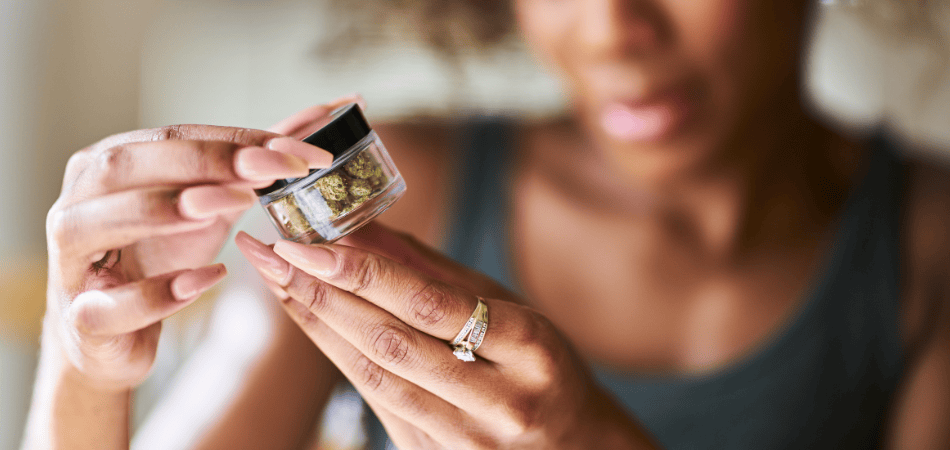Cannabis addiction
In recent years, the media has portrayed cannabis as a relatively harmless substance, and many countries around the world have begun to legalise it for medicinal and recreational use. This change in perception has led to an increase in cannabis use among people of all ages.
While many people enjoy cannabis without major issues, it is essential to be aware of the potential dangers and risks of cannabis addiction, particularly as cannabis use is second only to alcohol in the UK. Cannabis addiction affects many people around the country with serious negative consequences in every aspect of their lives.
- Page Content
- What is cannabis?
- What is cannabis addiction?
- Am I addicted to cannabis?
- How does cannabis addiction develop?
- What are the underlying causes of cannabis addiction?
- What are the health symptoms of cannabis addiction?
- What are the other effects of cannabis addiction on your life?
- How is cannabis addiction treated?
- Cannabis abuse and addiction in the UK
- How to get help for cannabis addiction
- Frequently asked questions
What is cannabis?
Cannabis, also known as marijuana, is a psychoactive drug derived from the Cannabis plant. It is used for recreational, medicinal, and religious purposes. The primary psychoactive compound in cannabis is delta-9-tetrahydrocannabinol (THC), responsible for the drug’s psychoactive effects. Cannabis is currently a Class B drug in the UK with a maximum penalty of five years imprisonment and a £2,500 fine for possession.
Cannabis comes in various forms, with the main two being:
- Dried flowers: Also known as buds, these are the traditional form of cannabis harvested from the female Cannabis plant and are typically smoked or vaporised.
- Concentrates: These are products made by extracting THC and other cannabinoids from the plant material, resulting in a more potent form of cannabis. Examples of concentrates include hash, shatter, wax and oil.
There are several ways to ingest cannabis, including:
- Smoking: The most common method of cannabis consumption involves rolling the dried buds into a joint or using a pipe or bong. Smoking delivers THC and other cannabinoids directly into the bloodstream via the lungs, providing rapid effects.
- Vaporising: Vaporisation, or “vaping,” is when you heat cannabis to a temperature that releases THC and other cannabinoids without combustion. This method is considered less harmful to the lungs than smoking.
- Edibles: Cannabis can be infused into various food products, such as brownies, cookies, gummies and chocolates. Edibles provide a slower onset of effects, as the cannabinoids must be metabolised by the liver before entering the bloodstream but many edibles are highly potent.
- Tinctures: Cannabis tinctures are liquid extracts that can be consumed orally or sublingually (under the tongue). Tinctures offer a discreet and smoke-free way to consume cannabis and can provide a rapid onset of effects when taken sublingually.
In recent years, the cannabis industry has grown exponentially, with many products being manufactured in labs. This has led to the production of more potent strains with higher THC concentrations, increasing the risk of addiction and adverse health effects.
What is cannabis addiction?
Cannabis addiction, also known as marijuana addiction, cannabis use disorder or marijuana use disorder, occurs when a person becomes physically and psychologically dependent on the drug. According to the National Institute on Drug Abuse (NIDA), approximately 9% of people who use cannabis will develop an addiction. This number increases to 17% for those who start using cannabis in their teens and 25-50% for daily users.
Am I addicted to cannabis?
Recognising the signs of cannabis addiction is crucial for early intervention and treatment. It can be challenging to identify cannabis addiction, as many people use the drug recreationally without issue. If you are concerned about your cannabis use, ask yourself the following questions:
- Do I use cannabis more often or in larger quantities than I initially intended?
- Have I tried to reduce or stop my cannabis use without success?
- Do I spend excessive amounts of time obtaining, using or recovering from cannabis?
- Do I experience cravings or a strong desire to use cannabis?
- Has my cannabis use led to problems at work, school or in my relationships?
- Have I given up or reduced involvement in important activities because of cannabis use?
- Do I continue to use cannabis despite knowing it causes physical or psychological problems?
- Do I experience withdrawal symptoms when I stop using cannabis?
If you answered “yes” to these questions, they may be signs of cannabis addiction so you should consider seeking professional help.
How does cannabis addiction develop?
Cannabis addiction develops through a cycle of use, tolerance, dependence and addiction.
When a person uses cannabis, they experience a “high” characterised by feelings of relaxation, euphoria and altered sensory perception. Over time, the individual may develop a tolerance to the drug, requiring larger amounts or more potent forms to achieve the same effects.
This can lead to dependence, where the person experiences withdrawal symptoms when not using cannabis and needs it just to feel “normal” or to function in their everyday life. Once a physical dependence is present, certain underlying conditions can contribute to a psychological dependence too.
What are the underlying causes of cannabis addiction?
Cannabis addiction can result from various factors, including genetic predisposition, environmental influences and individual characteristics. Some risk factors that increase your chances of developing a cannabis addiction include:
Family history of substance abuse or addiction: Genetics can predispose individuals to addictive behaviours and having a family history of addiction increases the risk of developing cannabis addiction.
Early initiation of cannabis use: Starting cannabis use at a young age makes the developing brain more vulnerable to addiction, increasing the likelihood of dependence later in life.
Mental health disorders, such as anxiety, depression or ADHD: Individuals with mental health disorders are more prone to cannabis addiction as they may initially use it for temporary relief but continued use can lead to dependence.
Exposure to high levels of stress or trauma: People experiencing stress or trauma might use cannabis as a coping mechanism, increasing the risk of developing cannabis addiction over time.
Peer pressure or social environment that encourages drug use: Social factors like peer pressure or a drug-promoting environment can significantly influence the likelihood of experimenting with and becoming addicted to cannabis.
What are the health symptoms of cannabis addiction?
Cannabis addiction can lead to several adverse health effects, both short-term and long-term. Some of these health symptoms include:
- Respiratory issues, such as chronic bronchitis and lung infections
- Impaired memory, attention and cognitive functioning
- Increased risk of mental health disorders, including anxiety, depression and psychosis
- Increased heart rate, which can lead to a higher risk of heart attack
- Impaired immune system functioning
- Decreased motivation and productivity
- Sleep disturbances such as insomnia
Recognising these symptoms can also help you identify cannabis addiction and encourage you to seek professional help.
What are the other effects of cannabis addiction on your life?
Cannabis addiction can also negatively impact various aspects of your life, with effects including:
- Strained relationships with family and friends due to excessive cannabis use
- Poor work or school performance due to cannabis-related lethargy or lack of motivation, leading to job loss or academic failure
- Legal issues, such as arrests or charges related to cannabis possession, use or supply
- Financial difficulties due to spending significant amounts of money on cannabis
- Social isolation as a result of prioritising cannabis use over other activities
- Difficulty maintaining personal hygiene and self-care
Understanding these broader impacts of cannabis addiction on your life can help motivate you to seek help and work towards recovery.
How is cannabis addiction treated?
Cannabis addiction treatment typically involves a combination of two important stages:
- Cannabis detox: Eliminates cannabis and other toxins from the body, breaking physical dependence and beginning the body’s healing process
- Cannabis rehab: Addresses the psychological aspects of cannabis addiction and teaches coping strategies to maintain long-term sobriety
Cannabis abuse and addiction in the UK
Cannabis is the most widely used illicit drug in the United Kingdom, with a significant portion of the population having tried it at least once in their lives. According to the 2020/2021 Crime Survey for England and Wales (CSEW), approximately 7.8% of adults aged 16 to 59 years reported using cannabis in the last year, which equates to around 2.6 million people. Among young adults aged 16 to 24 years, the prevalence was even higher, with approximately 18.7% reporting cannabis use in the last year.
These statistics highlight the importance of addressing cannabis addiction in the UK and providing accessible treatment options for those in need. Early intervention and effective treatment therapies can help individuals struggling with cannabis addiction overcome their dependency and lead healthier, more fulfilling lives.
How to get help for cannabis addiction
If you or someone you know is struggling with cannabis addiction, it is crucial to seek professional help as soon as possible. Oasis Runcorn has helped many people overcome cannabis addiction and truly transform their lives.
Contact us today to find out how we can help you take the first steps on the road to cannabis addiction recovery.










